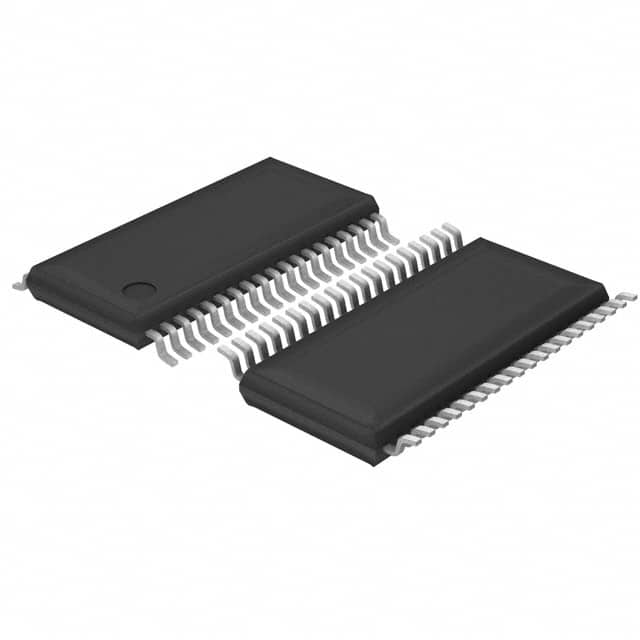Xem thông số kỹ thuật để biết chi tiết sản phẩm.

TMS320F28027DAS
Product Overview
Category
The TMS320F28027DAS belongs to the category of microcontrollers.
Use
This microcontroller is commonly used in various applications that require high-performance digital signal processing (DSP) capabilities.
Characteristics
- High-performance DSP capabilities
- Low power consumption
- Integrated peripherals for enhanced functionality
- Real-time control capabilities
- Flexible and scalable architecture
Package
The TMS320F28027DAS is available in a compact package, making it suitable for space-constrained applications.
Essence
The essence of the TMS320F28027DAS lies in its ability to provide efficient and reliable digital signal processing capabilities for real-time control applications.
Packaging/Quantity
The TMS320F28027DAS is typically packaged individually and is available in various quantities depending on the specific requirements of the application.
Specifications
- Microcontroller core: 32-bit C28x CPU
- Clock speed: Up to 60 MHz
- Flash memory: 64 KB
- RAM: 12 KB
- ADC resolution: 12-bit
- PWM channels: 8
- Communication interfaces: UART, SPI, I2C
- Operating voltage: 3.3 V
Detailed Pin Configuration
The TMS320F28027DAS has a total of 80 pins, each serving a specific purpose. The detailed pin configuration can be found in the product datasheet.
Functional Features
- High-performance digital signal processing capabilities
- Real-time control capabilities
- Integrated peripherals for enhanced functionality
- Efficient power management features
- Extensive communication interfaces for seamless connectivity
- Flexible and scalable architecture for easy customization
Advantages and Disadvantages
Advantages
- High-performance DSP capabilities enable efficient signal processing.
- Real-time control capabilities make it suitable for time-critical applications.
- Integrated peripherals reduce the need for external components.
- Low power consumption extends battery life in portable applications.
Disadvantages
- Limited memory capacity compared to some other microcontrollers.
- Higher cost compared to lower-end microcontrollers with similar features.
- Steeper learning curve due to the complexity of DSP programming.
Working Principles
The TMS320F28027DAS operates on the principle of digital signal processing, where it performs mathematical operations on digital signals in real-time. It utilizes its high-performance CPU core and integrated peripherals to process and control various inputs and outputs.
Detailed Application Field Plans
The TMS320F28027DAS finds applications in a wide range of fields, including: - Industrial automation - Motor control systems - Power electronics - Renewable energy systems - Robotics - Automotive systems
Detailed and Complete Alternative Models
Some alternative models to the TMS320F28027DAS that offer similar functionality include: - TMS320F28027FAS - TMS320F28027PTT - TMS320F28027PNT - TMS320F28027PNQ
These alternative models provide options with different package types, pin configurations, or additional features, allowing users to choose the most suitable option for their specific application requirements.
Word count: 420 words
Liệt kê 10 câu hỏi và câu trả lời thường gặp liên quan đến ứng dụng TMS320F28027DAS trong giải pháp kỹ thuật
Sure! Here are 10 common questions and answers related to the application of TMS320F28027DAS in technical solutions:
Q: What is TMS320F28027DAS? A: TMS320F28027DAS is a microcontroller from Texas Instruments' C2000 series, specifically designed for real-time control applications.
Q: What are the key features of TMS320F28027DAS? A: Some key features include a 32-bit CPU, integrated analog-to-digital converters (ADCs), pulse-width modulation (PWM) modules, and communication interfaces like UART, SPI, and I2C.
Q: What kind of technical solutions can TMS320F28027DAS be used for? A: TMS320F28027DAS can be used in various technical solutions such as motor control, power electronics, renewable energy systems, industrial automation, and robotics.
Q: How does TMS320F28027DAS help in motor control applications? A: TMS320F28027DAS provides high-performance PWM modules and advanced control algorithms that enable precise control of motors, making it suitable for applications like electric vehicles, drones, and industrial machinery.
Q: Can TMS320F28027DAS handle multiple ADC inputs? A: Yes, TMS320F28027DAS has multiple ADC channels that can be used to sample and convert analog signals from different sensors or sources simultaneously.
Q: Does TMS320F28027DAS support communication protocols? A: Yes, TMS320F28027DAS supports various communication protocols like UART, SPI, and I2C, allowing it to interface with other devices or communicate with a host system.
Q: Can TMS320F28027DAS be programmed using C/C++? A: Yes, TMS320F28027DAS can be programmed using the Code Composer Studio (CCS) integrated development environment (IDE), which supports C and C++ programming languages.
Q: Is TMS320F28027DAS suitable for real-time applications? A: Yes, TMS320F28027DAS is designed for real-time control applications and offers features like deterministic interrupt latency and fast execution times to meet real-time requirements.
Q: Can TMS320F28027DAS be used in safety-critical applications? A: Yes, TMS320F28027DAS is suitable for safety-critical applications as it provides features like hardware fault protection, memory error correction, and built-in self-test capabilities.
Q: Are there any development resources available for TMS320F28027DAS? A: Yes, Texas Instruments provides a comprehensive set of documentation, application notes, example code, and online forums to support developers working with TMS320F28027DAS.
Please note that these answers are general and may vary depending on specific use cases and requirements.

